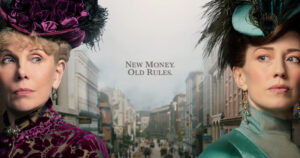It took an entire season, but The Gilded Age finally came through with a worthwhile episode. The season finale delivered on the hype by giving us an entertaining and watchable episode. I cared. I’m not saying the episode made me change my generally negative opinion about the show, but it gives me hope for season two.
Huzzah! Hurrah! I’ve been writing largely nothing but negative things about the show and I think that gives the impression I enjoy doing so. That I’m one of those reviewers who prefers to give negative assessments and make cutting remarks.
This is not true. I want The Gilded Age to be good because excellent entertainment is in my best interest. I prefer good shows. I’m not the sort to be happy when my team loses because it validates my hate. In any case, why was this episode good? Read on.
A Central Theme in the Gilded Age
I wrote an entire blog on why an episode needs a central theme to hold it together and the season finale had it. The entire episode swirled around the debutant coming out party for Gladys. Sure, we had Marion’s ice hot love life to distract us along with Peggy’s revelation and the chef’s troubles, but the entire episode had the structural support it needed.
With the debutant ball to hold everything together we came back to the main structure again and again. The side plots entertained us briefly but then we returned to the support that held everything together. This is the foundation of a good episode. It keeps us grounded and focused on a particular thing.
I hope my complaints earlier about the lack of such support make more sense now that we’ve seen it done properly. The actors are all working around this idea. The scenes are not scattered all over the five boroughs without relation to one another. Cohesions.
A Single Timeline
With the support of the debutant ball to focus the plots, the fuzzy timelines of all the previous episodes vanished. We didn’t see one character pass through a week while other characters were still back on the same day eating dinner. Because of the ball, everyone moved at the same rate. Everyone was going to the ball so time, by force, had to pass at the same rate for everyone.
Improved Acting
I’m not going to pass out awards for the acting but it showed a marked improvement. It wasn’t all about one character cutting down another with witty remarks. We didn’t have an overwhelming plethora of quick scenes designed around a zinger at the end. The main story forced the characters to work with one another, to care for one another. We saw longer scenes, real interactions, meaningful character development.
We had Raikes as a foil and the battle of wills between Bertha and Mrs. Astor played out through the friendship of their daughters. I was immersed in the battles.
Contrivance
Ok, there was a ton of contrivance, I know. The bank loan, the chef’s revelation and his drunken replacement, the letter revealing Peggy’s son, the elopement and the ball on the same night, it was all clearly contrived and rather silly but I can overlook that when everything else is well done.
I’ve said it before and I’ll say it again, there must be conflict and sometimes that requires coincidence and a little creativity from the author. Believe me, I’ve done it my books and I don’t begrudge the writer a bit of leeway in this regard.
Conclusion
I’m very pleased to be writing this positive review of The Gilded Age. I wish I could have done it earlier. The season finale did things properly as far as structure and that elevated the entire episode.
The idea is technical and I won’t get delve deeply but there is a thing called the Five Act structure. It’s been around since ancient Greece. It’s a foundation upon which to build a story. Ignore it at your peril.
Tom Liberman
